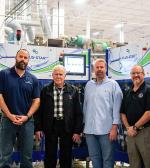CHICAGO — The laundry and linen services industry is based on many factors.
A key factor in the successful processing of goods is relationships, and one of the most important relationships is that of the chemical representative and the laundry operator.
How involved should a chemical rep be in a laundry’s washroom operation?
American Laundry News reached out to operators and chemical suppliers and communicated with five professionals on this subject.
Miriam L. Avila is operations team leader for Roscoe, a uniform rental company in Chicago; Chad Dare is executive vice president of sales for Pariser Industries in Paterson, New Jersey; Steve Tinker is senior vice president of research and development, marketing, for Gurtler Industries Inc. in South Holland, Illinois; Graham Skinner is vice president of large laundry sales for UNX-Christeyns in Greenville, North Carolina; and Leonardo Gastelum is director of national accounts, customer care, for Norchem Corp. in Los Angeles.
In general, how involved should a chemical representative be in a washroom operation?
AVILA: I think is vital that the chemical representative is involved as much as possible, hands-on inspecting and verifying that everything is running smoothly.
Interacting with the wash floor operator and quality inspectors. Looking for opportunities to enhance quality and or savings.
DARE: Very. Customers should be able to rely on their rep’s core competencies and industry expertise as it relates to the entire laundry operation.
One size will not fit all, and it is the responsibility of a good representative to determine that customer’s needs and how best to complement their existing abilities to produce beneficial outcomes.
TINKER: Good wash formula design, taking into account time, temperature, mechanical action, and chemical action, requires a broad understanding of the entire laundry operation.
For example, wash formulas that are focused on reducing chemical cost could be designed to make up for the lower chemical action by increasing both time and temperature.
However, that could cause an unwanted increase in energy usage and a decrease in production, or pounds of clean laundry produced per hour. So, understanding all of the factors that can affect the overall operation are a key responsibility of a well-qualified chemical representative.
Good chemical reps can act as a consultant that reviews your overall operation, from soil sort to washing to final finishing, to make sure that the process is running smoothly at maximum efficiency, producing the highest possible quality at the lowest possible overall cost.
SKINNER: Chemical reps should be seen as active partners in achieving quality outcomes in an operation. In many cases, they can see a problem coming in advance, of its arrival.
The chemical program, plant procedures and equipment condition are all interdependent on each other, to achieve these outcomes. Good discussion and dialogue across these three aspects are important and something the chemical rep should be a part of.
GASTELUM: The involvement of a chemical representative in a washroom operation can vary depending on several factors, most significantly the specific needs of the laundry, but also the expertise of the representative and the level of support desired by the laundry operators.
While there is a lot of machinery and software that run a washroom, our industry has set a standard and the expectation that the chemical rep is most often the link that connects them all.
The versatility of a chemical rep’s expertise and know-how is critical. Despite whether it is expected of them by the customer or is something unrelated to their direct role, chemical reps must take the initiative to learn the washroom from start to finish to understand the impact it has on the wash operations and quality of the finished goods.
This would mean that, overall, chemical reps should be moderately involved in the washroom, at a minimum, with an emphasis on providing technical support and expertise to optimize cleaning and hygiene processes.
How often should a rep contact and visit the laundry? Why?
AVILA: I think every other week is a good balance for visits, allowing us and the rep time for feedback and or changes and to address any issues.
DARE: It depends to a large degree upon the size and nature of the operation.
Dispensing systems require routine oversight and maintenance. Powder programs require less oversight.
Obviously, overall laundry linen tonnage, the quantity of different soil classifications, the customer’s requirements and the related chemical will play a role in setting up appropriate service scheduling.
TINKER: Generally, a once-per-month visit is recommended. The length of a service visit can vary from four to eight hours; however, for very large operations, that service call could be completed over a couple of days.
But don’t consider the time factor of a service call as a measure of the quality of a service call. Thoroughly trained, experienced chemical reps can delve into problem-solving quickly and effectively, proposing a plan of action to resolve issues.
Another thought: well-designed and engineered chemical dispensing systems with proven service life and robust performance are key.
If your rep is spending too much time testing, calibrating and/or repairing their chemical dispensing system, they may not be paying attention to the laundering operation and process to identify potential concerns, quality issues or formulations that are out of balance.
SKINNER: Barring special projects, emergency calls or contract stipulations, once a month would be the absolute minimum. For very large, high-volume plants, once a week spot check may be required.
I have found that twice a month for medium to large plants is a good balance, giving a visit for titrations, formal reports, water analysis check and inventory. The other is for inventory control, follow-up, quality checks, preventative maintenance, etc., or some variation of this.
GASTELUM: Depending on the demands of the customer’s operation, a schedule can be determined (and fine-tuned) to ensure the needs are satisfactorily met.
Regular virtual contact and routine in-person visits that range from once a month to every other month are typical for maintenance visits of operations that don’t require frequent support.
When demand is higher, biweekly to monthly is preferred to maintain relationships and help address issues promptly.
Except for the start-up of a new customer, a rep that needs to be present weekly as a result of recurring issues is an indicator that operations should be evaluated for optimization or expectations reset with the customer.
Who should the rep be working with at the laundry? Why?
AVILA: Wash floor operators, quality control inspectors and operation team leaders.
DARE: The rep should work first and foremost with the department head and/or their designees.
Additionally, a rapport should be developed with administrators and general managers to establish familiarity with the key players in ensuring program success.
Lastly, respect and time should be paid to the floor personnel to get their front-line input.
TINKER: Gurtler Industries recommends that our representatives meet with the owner or general manager at the beginning of the service call to review any recent concerns that may have developed since the last service visit and at the end of the service call to review all of the actions and recommendations that we included in our service report.
During the service call, the rep should interact with line management or leads in each department, (such as soil sort, washroom, finishing department, maintenance, etc.) to make sure that any issues are reviewed.
SKINNER: Obviously, the general manager and operations manager. Having a good working relationship with the maintenance team is very important as well.
Serving as an extra set of eyes in the plant, the chemical rep can help assist in issue discovery usually before it happens.
Other, sometimes overlooked, staff members the chemical rep should interact with are floor leaders and personnel doing the job. They are a great lens when it comes to gauging quality. They are in front of it all day, every day.
GASTELUM: At each visit, the rep should work regularly with the laundry manager, supervisors, chief engineers and maintenance staff.
It is also important to interact with the staff operators who process the textiles and garments.
Doing this ensures visibility into what the operators are seeing daily from all viewpoints and provides insight into challenges that may arise, such as quality or machinery issues, when troubleshooting.
Check back Thursday for the conclusion, which will cover steps to creating good relationships, warning signs to watch for and final thoughts.
Have a question or comment? E-mail our editor Matt Poe at [email protected].








